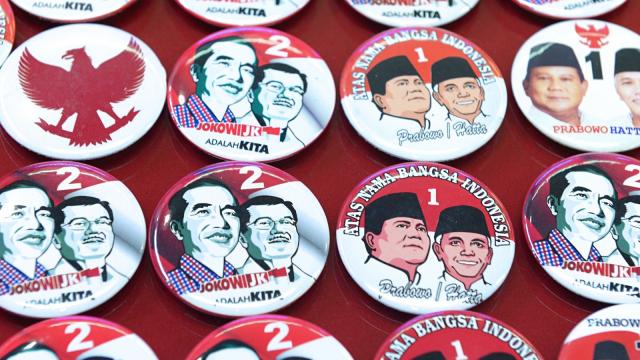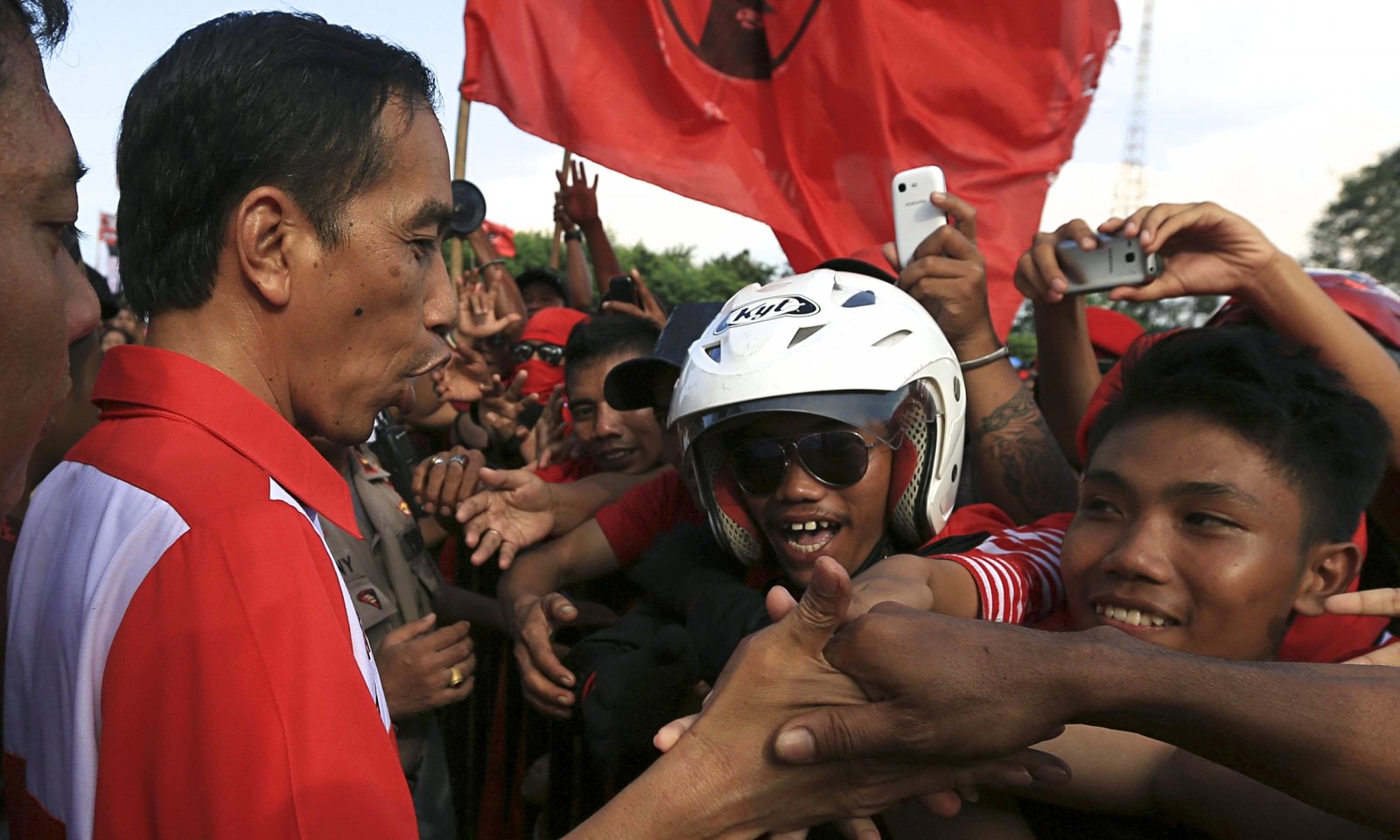
It is an election that may turn out to be a watershed moment for one of the world's biggest countries.
In one corner: A man who defies the stereotypes of Indonesian politics, where wealth and privilege come as standard. Joko Widodo – "Jokowi", as he is known – is a modest man from outside the system, who tellingly chooses to carry his own luggage when he travels.
In the other corner: A former general with solid links back to the bad old days of dictatorship, who is banned from visiting the U.S. because of allegations of human rights abuses committed while in uniform. Prabowo Subianto not only served as a general under Suharto, the autocrat who ruled for 31 years. He was the dictator's son-in-law.
As Wednesday's election approaches, the choice on offer could not be more stark: a candidate promising a new, clean leadership that consolidates democracy, or an alliance of old-school elites led by a man that some fear could wind back democratic freedoms.
"If Jokowi gets elected, it would be a turning point for Indonesia and democracy," says Endy Bayuni, a senior editor at the Jakarta Post. "A leader that is not tainted by the past and Suharto's corrupt political culture."
Wildcard
In a political system dominated by figures who rose to prominence during Suharto's authoritarian regime, Jokowi is a wildcard.
Raised in a ramshackle slum area in the central Java town of Solo, he developed a successful medium-scale furniture business before becoming the local mayor and, most recently, the governor of Jakarta.
"From his time as governor, we can already see the 'Jokowi effect'," says the Jakarta-based film-maker and Jokowi supporter Joko Anwar. "Just months after he became governor we could no longer bribe government officials because they were scared they would get 'Jokowi-ed'."
Here in the capital – where small bribes are an accepted part of negotiating a complicated bureaucracy – Jokowi has developed a reputation for clean governance, humility and hands-on approach to leadership.
His supporters refer back to his track record in Solo and Jakarta, where he has enacted small but significant changes. They are hoping that Jokowi, 53, can replicate his approach to re-energize and clean up politics at the national level.
A pro-active Mr. Fix-it type who visits slums to talk to residents and inspects sewers first hand, Jokowi told Indonesian voters last month that he wants to start a new political tradition, "where a president is not a political party leader, but its best man."
But as the vote draws closer, he seems to be losing his edge. Over recent months, Prabowo has surged closer to his opponent, whittling down Jokowi's lead of 30% to single digits.
A survey jointly conducted by the Washington-based International Foundation for Electoral Systems and the Indonesian Survey Circle from June put Jokowi on 45%, with Prabowo at 38.7%. Other polls show Jokowi in front by just four percentage points.
The margins vary significantly in different polls but it is clear the number of undecided voters is dropping – swayed by Prabowo's slick campaign, clear messaging and fiery speeches about reclaiming Indonesia's natural resource wealth for its people. Both candidates have campaigned on nationalistic platforms, but Prabowo has been the more impassioned of the two.
"We don't want to become an enslaved nation, we don't want to become a lackey nation, we don't want to be trampled on by other nations," Prabowo told his supporters at a rally on May Day this year. "Prabowo will not be your lackey, Indonesia will not be your lackey."
Backed by his tycoon brother Hashim Djojohadikusumo, and most of the country's TV stations, this is the third time Prabowo, 62, will run for president and he is getting better at delivering patriotic messages that appeal to the masses.
Prabowo supporters, tired of the indirect, Javanese style of the current president, Susilo Bambang Yudhoyono, say Indonesia needs a strong, commanding and decisive leader.
"I like Prabowo because he is assertive, disciplined and decisive," says Dalim Tunggali, a 50-year-old contractor from east Jakarta. "A nation is respected by other countries because of its leader. If the leader is assertive, we are going to be respected."
Abdul Mukti, 67, says he admires Prabowo because he "serves the public, and is an honest solider defending truth, honesty and justice."
But others are not convinced by the rhetoric, pointing to Prabowo's tainted past and ties to the old order.
A former commander of Kopassus, the army's special forces, Prabowo stands accused of human rights violations during Indonesia's occupation of East Timor, and of ordering the kidnapping of pro-democracy activists during the tumultuous events in Jakarta in 1997 and 1998.
"Indonesia doesn't need a strong leader," says Christine Naomi, 56, on the sidelines of a recent Jokowi rally in Jakarta. "All this time, Indonesia has always been led by generals. They are all incapable of bringing change."
Since the fall of Suharto in 1998, Indonesia has transformed itself into a stable and democratic nation with a powerhouse economy. Yet some observers say this remarkable progress is easily reversible, and point out that Prabowo has said he wants to return to an earlier form of the constitution that places more power in the government's hands. Prabowo has sought to reassure people that he believes in democracy and does not want to return to an authoritarian government.
Judy Francesca, who has worked as a personal assistant in Prabowo's political party, Gerindra, for the past three years, says the former general is not what critics make him out to be.
"If you have ever heard the expression, 'Don't judge a book by its cover,' that is exactly what I did before I got to know Bapak Prabowo in person," she says. "He has shown many selfless acts for the greater achievements for Indonesia, even though in the end no one recognised his efforts at all."
Prabowo supporters also say the allegations of rights abuses are unproven – and even if they are true should be understood in context.
"He had to defend the nation," says a supporters, Tunggali. "If his boss asked him to do something, he had to do it. It was not in his capacity to decide whether it violated human rights or not." Others say the allegations are just gossip.
Prabowo, who is banned from entering the United States on account of the alleged rights abuses, was dismissed from the military for his perceived role in the student abductions but has never been tried in a civilian court.
Smear
While Prabowo's slick campaign has clearly been effective, analysts say Jokowi's image has been damaged by a series of smear campaigns, in particular rumors that he is Christian and ethnic Chinese.
"Every time, in any democracy, that a candidate has to spend time fending off rumors and allegations about their personal identity is time in which they are basically conceding the field," observed Douglas Ramage, an analyst with the Bower Group.
To counter the rumors in a country that is almost 90% Muslim, Jokowi has declared his support for Palestinian statehood and distributed pictures of himself on the hajj pilgrimage to Mecca.
The Jokowi camp has also gone on the offensive. A document believed to be Prabowo's army dismissal letter was recently leaked online anonymously, and former generals who support Jokowi have publicly questioned Prabowo's mental stability.
Whatever the outcome, this election is significant because it will mark the first time in Indonesia's history that power will be handed over from one directly elected leader to another. Yudhoyono has already served the maximum of two five-year terms and is ineligible to run for a third time in office.
For some, the argument about his successor is more about the style of government that would ensue rather than its concrete policies.
"Put it this way: if Jokowi becomes president and is not what we hope him to be, we can easily criticize him and bring him down," says film-maker Joko Anwar. "But if Prabowo becomes president, we are scared that might not be so easy. That what we worry about him is true."
3 WAYS TO SHOW YOUR SUPPORT
- Log in to post comments












